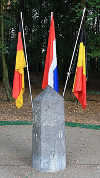Dutch with an accent just as easy to understand
 People who speak Dutch with a foreign accent are just as easy to understand as native speakers. Listeners may need a while to adapt to the accent, anywhere from a few sentences to a few minutes.
People who speak Dutch with a foreign accent are just as easy to understand as native speakers. Listeners may need a while to adapt to the accent, anywhere from a few sentences to a few minutes.
Yesterday Marijt Witteman received her PhD for researching how fast listeners adapt to foreign accents. One perhaps surprising finding was that native speakers who were used to the accent, for instance, Dutch people living near the German border listening to Dutch spoken by Germans, understood words pronounced by language learners just as fast as they understood words pronounced by native speakers.
Even listeners who were not regularly exposed to the foreign accent only needed a few minutes of ‘priming’ to get up to speed. Witteman used reaction time tests in which subjects first heard a word, then saw the word written out on a screen, after which the subjects had to state if a word existed or not. Previous experiments had shown that people respond faster if they hear the word before they see it on the screen. The response times for words pronounced with an accent were just as fast as for words pronounced without an accent.
Witteman’s results could be useful in designing language courses. Course materials could be less about perfecting pronunciation and more about understanding a language. My personal take-away lesson is that Hollanders can stop pretending they don’t understand what the rest of the Dutch are saying. The game is up!
(Photo by Leo Viëtor, some rights reserved)

Interesting! While this doesn’t seem to be within the scope of the study, I wonder if the tendency of some second-language Dutch speakers to speak more slowly balances out unusual pronunciation and making them easier to understand in that way.
(For me, up here in Friesland some of the hardest people to understand are native speakers!)
“I wonder if the tendency of some second-language Dutch speakers to speak more slowly balances out unusual pronunciation”
From what I understood of the experiment, they tested using single words, so I am not sure a slower pronunciation would have mattered much. They also divided the accents into categories, weak, medium and strong.